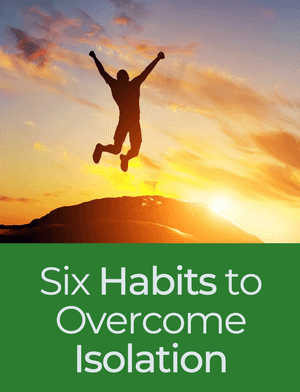
Get the Six Habits for Overcoming Isolation Guide for free


In today's relentlessly fast-paced world, burnout is not just a buzzword—it's an all-too-common reality for many of us. Amidst the tangles of professional deadlines, personal commitments, and the pressure to keep pushing forward, we often forget a critical aspect of our well-being: our emotional cycles. Understanding and managing these cycles is crucial in our collective fight against burnout.
Emotional cycles are the natural ebbs and flows of our feelings. They encompass the entire spectrum of human emotions, from joy and excitement to sadness and frustration. Like the day morphs into night and then into day again, our emotions, too, are meant to cycle completely. Yet, in our race against time, these cycles often get disrupted, which can pave the path to burnout.
Burnout doesn't appear out of the blue. It creeps up, spurred by incomplete emotional cycles. The more cycles we leave unresolved, the more emotional "debt" we accumulate. Over time, this debt can escalate into a state of chronic physical and emotional exhaustion—burnout.
Recognizing disrupted emotional cycles is the first step in reclaiming your emotional health. Symptoms may range from constant feelings of overwhelm, persistent anxiety, or emotional numbness. These manifestations are your mind's way of signaling that your emotional needs aren't being met.
There's a profound link between authenticity, emotional suppression, and burnout. When we spend our days donning masks—pretending to be someone we're not, suppressing our true feelings—we create a rift between our external actions and our internal emotions. This inconsistency can exacerbate feelings of burnout and further disrupt our emotional cycles.
Consider, for example, John—a software developer. He's passionate about coding but struggles with the corporate politics in his workplace. He suppresses his true feelings, conforming to the culture for the sake of job security. Over time, this emotional suppression leads to constant exhaustion, a classic symptom of disrupted emotional cycles, and consequently, burnout.
Addressing disrupted emotional cycles involves implementing practical strategies that allow emotions to run their course. Physical activities such as running, yoga, or even just a brisk walk can help. These activities provide an outlet for stress, helping to complete the emotional cycle.
Emotional cycles can also be completed through affection—hugs, kisses, or meaningful conversations with loved ones. Creative self-expression, like writing, painting, or singing, offers a safe space to process emotions and relieve stress.
Specifically for those of us in tech or analytical roles, we can apply our problem-solving abilities to managing our emotional cycles. Approach it as you would a complex project: Identify the issue (disrupted emotional cycles), explore solutions (physical activity, affection, creative self-expression), and implement these fixes into your routine.
Authenticity plays a crucial role in maintaining healthy emotional cycles. By aligning your actions with your true feelings, you can foster a sense of fulfillment, reducing the risk of burnout.
Start by identifying your core values. What truly matters to you? How do these values translate to your personal and professional life? Integrate these values into your daily routine, allowing them to guide your actions and decisions. The closer your life aligns with your values, the less likely you are to experience burnout.
Understanding and managing emotional cycles is a powerful tool in your arsenal against burnout. It's not a quick fix, but a journey—a journey of self-discovery, authenticity, and emotional intelligence. And as we continue to untangle our emotional cycles and find our authenticity, we pave the way for a fulfilling life free from burnout.
Remember, your emotions aren't an enemy to be suppressed or ignored. Instead, they are allies, guiding you to live a life that aligns with your innermost self. It's about time we changed our perspective on emotions, viewing them not as mere reactions, but as integral to our overall well-being.

Get the Six Habits for Overcoming Isolation Guide for free